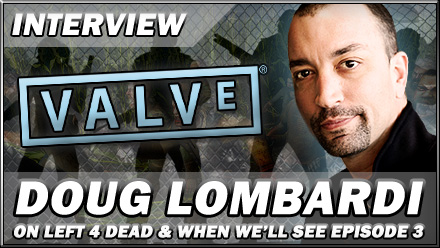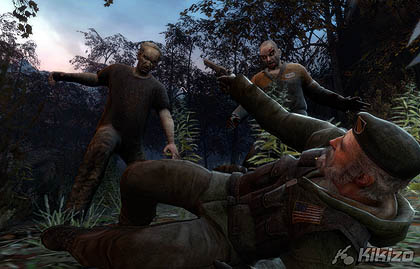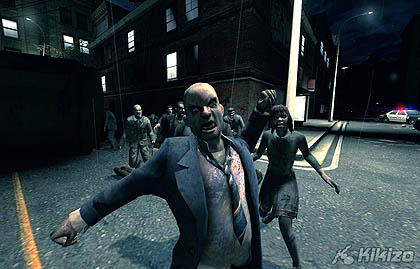Interview: Valve's Doug Lombardi
Always a pleasure to meet with, Doug Lombardi - owner of The Best Laugh in Gaming - speaks with us about Left 4 Dead and Half-Life 2: Episode Three. [Ep2 spoiler removed!]

Doug Lombardi, like most things about the unspeakably awesome games developer that is Valve Corporation, is refreshingly straightforward. He's not afraid to talk honestly about industry relationships where other company representatives would soil themselves right there in the interview chair.
In this latest chat, we discuss the latest Valve hot topics - sadly not including Portal: Still Alive - but looking at the Half-Life 2 series and the hopefully not-too-distant Half-Life 2: Episode Three. We find out more about the imminent PC and Xbox 360 release Left 4 Dead, and why the cake was anything but a lie for its original creator.
Kikizo: You're not doing a PS3 version of Left 4 Dead. We all know the PS3 version of Orange Box was a bit ropey - did you just decide this time you couldn't be doing with all that again this time?
Lombardi: [laughs] You know, we didn't shop the PS3 Orange Box; EA came to us and said, "you're making this new Half-Life thing, can we make it multi platform?", and we said "sure". If somebody came to us and said, "can we do a platform extension of Left 4 Dead?", then we'd have a conversation with them. I think part of the reason folks came to us on that one [Orange Box for PS3] was because it was a Half-Life property and they knew it was money in the bank. Left 4 Dead is kind of a risky proposition, and it's an unproven IP. So I think if this one hits, you'll probably see someone saying: "Can we quickly put this out on another platform?!", or, "when you guys do a sequel, can we do it on another platform?" You know, people kind of assess the risk of the investment - and anything related to Half-Life or Half-Life 2, the risk is a lot lower than, "hey, new franchise! Trying to do new gameplay!"
Kikizo: Sure, it's a unique angle with the pure co-op focus - but you can play singleplayer as well, right? I am thinking of console players who maybe don't have Live yet.
Lombardi: The way it's set up is there's campaign mode, which is the four survivors going through the four campaigns, made up of five maps each, and that can be played [with] one to four players - but there will always be four players on the team, so it could be single player co-op, or two players plus two bots. It scales up like that, so it's designed to always have four of the survivors moving forwards, and whether they're humans or bots is up to the individual player to decide. So that would be the closest thing to a single player experience that's offered.
Kikizo: One of the things I've noticed about playing it with three other people is that everyone seems to naturally stay close together rather than straying away, which helps the gameplay flow. And yet the maps are big. How do you keep people close?
Lombardi: Yeah, firstly, I think when you creep people out in a scary environment, they tend to stay close together naturally! Secondly, if you don't do that, we're going to punish you and beat you into submission! So I mean, just as Counter-Strike was sort of unapologetic that if you got shot in the first minute of the five-minute match, you'd be out until that match was over - that was a huge risk that those guys took when they designed that mod, and it never would have gotten green-lit by a publisher multi-player only if you could be sitting for as long as four minutes - you wouldn't even have gotten a meeting! [laughs]. But it's turned out to be the winning formula for like, nine years now. So in the same way, Left 4 Dead is being unapologetic about the fact that it's a co-op game. You're supposed to play together - and if you don't you're gonna die! Or at least, the chances are like 95 per cent - you know, unless you're this amazing 'Thresh' or 'Fatal1ty' style player - you're not going to make it.
Kikizo: The game influenced the acquisition of Turtle Rock Studios by Valve. Can you talk us through how that came about?
Lombardi: So going back to E3 2003, Michael Booth had left Westwood and he was looking for something new to do. His life-long - or career-long - passion has been AI; he did Nox and C&C Generals when he was at Westwood. We wanted to hire him, and we wanted to bring him up to Valve to work on Half-Life 2 and make the AI even better that it was. And he said: "I really want to work with you guys, but there's no effing way I'm moving to Seattle - I live in Southern California, and I don't like the rain!" So we said "OK, why don't you make a bot for Counter-Strike, we'll put it in Condition Zero, and we can use that in the Xbox version of Counter-Strike". Then we started doing Counter-Strike Source, and we needed some help because we were all heads-down doing Half-Life 2, and he was like, "I've got a couple of people we can hire and we can do Counter-Strike Source in collaboration with you guys." So we did that!
And then 2005, after all that stuff had shipped, he said "I have this idea for a zombie game." And it was co-op, pretty different - the high concept is the same as what you've seen, but it wasn't exactly like it. So we have a couple of people at Valve work with him on the iteration of the R&D on that - and by that time it wasn't just Mike any more, it was probably six or eight people. They R&D'd it, prototyped it... there were probably about three noticeable iterations of it worked on through the course of the year.
So at some point in late 2005, early 2006, everyone was starting to feel we had the right thing. And by that point, he had grown Turtle Rock to be eight or nine people, or whatever it was at the time - he'd sort of recruited people from Valve to be working on the team - [laughs] - so we were like, we'll co-develop this thing together, and we'll stick it through our publishing agreement with EA, we'll stick it on Steam, and all that kind of stuff.
And then it started really gaining momentum! More and more people at Valve wanted to work on it, we started showing it to the press... we started saying, "wait - this thing's got real big potential." We're basically acting as one unit, but we're two different companies - why don't we just officially make it one company, but with two different offices? And Mike was really open to it.











 Satoru Iwata Video Interview - the late Nintendo president spoke with Kikizo in 2004 as 'Nintendo Revolution' loomed.
Satoru Iwata Video Interview - the late Nintendo president spoke with Kikizo in 2004 as 'Nintendo Revolution' loomed. Kaz Hirai Video Interview - the first of Kikizo's interviews with the man who went on to become global head of Sony.
Kaz Hirai Video Interview - the first of Kikizo's interviews with the man who went on to become global head of Sony. Ed Fries Video Interview - one of Xbox's founders discusses an epic journey from Excel to Xbox.
Ed Fries Video Interview - one of Xbox's founders discusses an epic journey from Excel to Xbox. Yu Suzuki, the Kikizo Interview - we spend time with one of gaming's most revered creators.
Yu Suzuki, the Kikizo Interview - we spend time with one of gaming's most revered creators. Tetris - The Making of an Icon: Alexey Pajitnov and Henk Rogers reveal the fascinating story behind Tetris
Tetris - The Making of an Icon: Alexey Pajitnov and Henk Rogers reveal the fascinating story behind Tetris Rare founders, Chris and Tim Stamper - their only interview? Genuinely 'rare' sit down with founders of the legendary studio.
Rare founders, Chris and Tim Stamper - their only interview? Genuinely 'rare' sit down with founders of the legendary studio. The History of First-Person Shooters - a retrospective, from Maze War to Modern Warfare
The History of First-Person Shooters - a retrospective, from Maze War to Modern Warfare